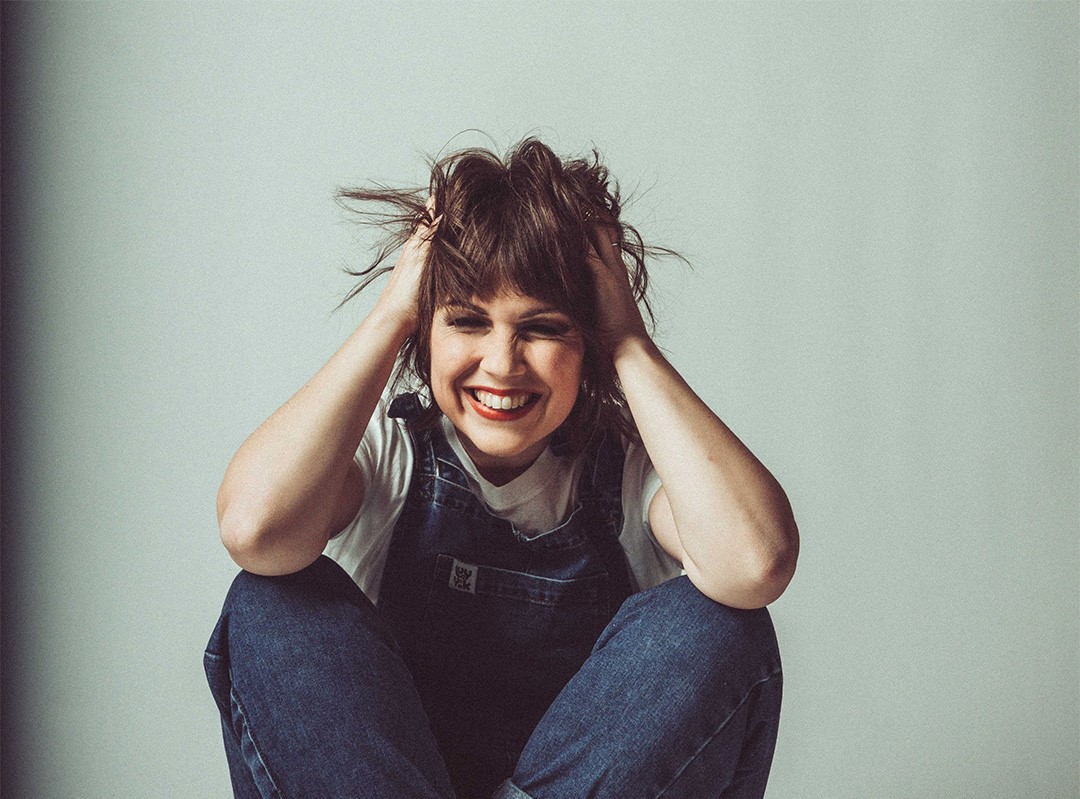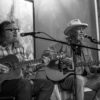As Angharad settled into being a mother, this new period of her life led to her growing serious songwriting chops. The Swansea musician on her debut album Motherland celebrates motherhood in its glory and gore, beautifully and bravely, via pure pop, dreamy ballad, bouncy brass, dissonance, spoken word, and campfire singalong.
Angharad took time out to share her thoughts on the album, becoming a songwriter, and much more.
Title track ‘Motherland” is very intimate and romantic. In the song, you mention strength. Do you think there is a pressure on women to be strong, whether mother or not? If so, how do you deal with that?
This is a really interesting question, which, until you’d asked, I hadn’t considered in any great detail. But, as the frequency illusion would have it, the words ‘strong women’ have been jumping out at me from all corners of the internet last weekend. (It has just been International Women’s Day and Mothering Sunday).
With regards to giving birth, I can honestly say that it’s the strongest, most powerful I’ve ever felt. However, in general, I’m not sure if there’s any more pressure on women to be strong than there is on men. However, I suppose of all the qualities we should be championing, kindness and compassion should be celebrated above all else.
‘Postpartum‘ is dark and dissonant, and stark. You sugarcoat nothing around the challenges of motherhood. There is wit in there too…the basics of having the use of both one’s hands is very underrated!
I’m glad you’ve picked up on the dark humour. Some think it’s a particularly depressing track, but you’ve got to see the funny side sometimes.
When writing a song, I sometimes ask myself “who needs this?” A song can be a great vehicle to open up a conversation or discussion, and that was my intention with Postpartum.
I feel there are some aspects of motherhood that just aren’t aired publicly, such as – like you say – the basics of being able to use of both hands. There are aspects of motherhood that are concealed from art and even private conversations. I wanted to change that.
If anyone wants to know the reality of motherhood, warts ‘n’ all, Postpartum has it covered in three minutes. It’s all the stuff I wish I’d known about motherhood before I became a mum. I hope this song serves a purpose for anyone intrigued to know what it’s really like, but has been afraid to ask.
‘Little Baby Embryo’ is the sweetest lullaby, did you intend that when you wrote it?
I suppose it could be considered as a lullaby for an unborn child. I wrote this after having a miscarriage. It was a particularly gruesome experience physically, but emotionally I channelled everything into this song.
Again, it’s not a subject you come across often in popular song. By processing my own emotions and experiences into song format, I hope I might help others who might be going through the same thing. Some have already messaged to say that this song has had them in tears. I consider that to be an achievement.
To me ‘Because I Am A Woman‘ is the tale of every woman, no matter her circumstance – musician or non-musician, mother or child-free. Thoughts?
Absolutely. It’s the ultimate girl power song! This song was bourne from my own personal experience and discrimination I faced as a woman in the music industry. But there’s no direct mention of that in the song, so it can be applied to any woman regardless of her situation or circumstance.
I’m really proud of this song, and I hope that the sentiment resonates with most women.
The country-flavoured inflections in ‘Hey, There’s Always the Night’ are so charming, laid back, with late night feels…you’ve said how becoming a mother increased your urge to create and write?
I experienced an unexpected surge of creative energy in the weeks and months following the birth of both my children. Both times, songs poured out of me. I couldn’t work quickly enough to capture all the ideas, most of which started life as hurried mumblings into my phone’s voicenotes app.
I put it down to slowing down and being more mindful and open to everything around me. Although there’s something to be said about fertility and creating new life; the body may well have been prepared physically, mentally and hormonally for creative activities.
Or perhaps the strange, anxious state of chronic sleep deprivation may have contributed in some way. Either way, the past few years have felt like an intriguing and thrilling creative awakening. I hope it continues, because making a baby each time I want to write a new album isn’t a particularly sustainable process!
How did ‘Babi Ni’ come about? It’s a joyful end to the record. Great fun, and celebratory.
This is one of countless silly, little songs I made up to sooth and entertain my babies. When the kids were newborns, I’d fling them over my shoulder, and bob up and down to this song. I’d bob across the house, from room to room, sometimes desperately singing this song to get them to stop crying.
Aeddan Williams, who produced and arranged the album suggested we record it live with everyone gathered around one mic, to capture the playfulness of the song. We have the full band, Sam Barnes the engineer, Aeddan’s mum and wife are also on the recording, my partner Dafydd, baby Idris and Tanwen. The inspiration for doing it this way was Bob Dylan’s ‘Rainyday Women’ #12 & 35.
You hear my daughter Tanwen singing in the final moments of the album. She was only two when I captured that recording. She had limited vocabulary, but she could belt out that number no problem!
Your background is in folk; how did you find navigating the path to pop(ular music) – and indeed songwriting for the first time? Was it a natural move and progression, something you’ve been wondering about for a while? Do you have the songwriting bug in a major way now?
The songwriter in me made an unexpected and very bold appearance in 2021, and hasn’t left. Although when I think about it, she has been hanging around in the wings at various points in my life. For example, I remember writing silly little songs when I was in school to help me remember facts for my History GCSEs.
My father was a poet. As a teenager I would ask him to help me write a song, but he would come back with, “what do you want to write about?” At the time, I couldn’t answer him. I didn’t feel I had anything worth writing about, that hadn’t been said already. That’s all changed now. I feel I have so much to say, and there are plenty of things that haven’t been explored enough in popular music. Motherhood is just one of them.
I have well and truly caught the song-writing bug. I don’t know how I coped and made sense of my life and my emotions before. But then again, pre-children, I was probably coping quite well with life!
What is the first song you wrote? To what extent was it a learning experience for you?
The first full song I wrote was in January 2021. I’d been asked to judge the Cân i Gymru songwriting competition for S4C and I felt like a complete fraud. Despite working as a musician for 15 years, I wasn’t a song-writer. However, after listening to 98 songs over the course of two days, I went back to my hotel room in Cardiff that night, and worked hard on completing a half-finished idea. That song was ‘Outsider’s Map of Wales.’ Unfortunately it didn’t make it on to the album, due to the time limitations of vinyl, but I do perform it live. It’s a bizarre song about the mis-pronounced place names of Wales, and it goes down well.
The image of songwriting walks sounds very appealing. How did they come about, how did they help your songwriting?
I love the term songwriting walks. Thank you for giving a name to a creative process I discovered unintentionally during lockdown. It involved moving my body in some way out in the fresh air. Ideally in green spaces, but even the urban streets of Swansea around my home worked well.
I’d start my day off with a walk to kick start the creative process (usually with my baby in the pram). On my return home, any lyrical or melodic idea that came to me on those walks would then be crafted into a song.
I’ve read that there’s something about moving one’s body and getting the blood flowing that can aid creativity, and get you into a state of flow. Similarly, moving images, such as when driving a car, can help spark ideas. Julia Cameron mentions this in her book The Artist’s Way.
For me, the muse is hanging around on street corners, or in the trees. All one needs to do is get out there to make acquaintance with her. Who knows what might happen…
Motherland is out now, via Libertino Records.




